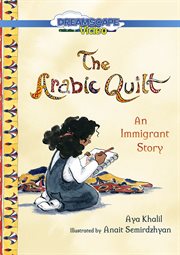Review by Booklist Review
Kanzi is the new girl in third grade, and as an Egyptian American, she's uncomfortable displaying her cultural differences. When the teacher announces a class project to make a quilt out of every student's name written in Arabic, Kanzi's classmate responds, "We live in America. My mom says we should only speak English." Following a lesson in etymology and an experience of classroom-bonding over Arabic, all racist views are recanted, and Kanzi feels pride in her culture. Khalil tells an earnest story, leaning on dense dialogue peppered with Arabic phrases (defined in the back matter), that draws on her own childhood as an Egyptian immigrant. While the intent is good, the repeated message that coming from a different culture makes you "special" feels a bit outdated--especially with Kanzi cast as one of only two students of color in the class. Stilted dialogue ("'Aren't languages a beautiful thing? They can truly unite us!'") gets in the way of an otherwise helpful window into the experience of immigrant children, aided by some colorful flourishes by Semirdzhyan.
From Booklist, Copyright (c) American Library Association. Used with permission.
Review by School Library Journal Review
K-Gr 2--Kanzi, a young Egyptian immigrant, is nervous about looking different on the first day of her new school. When Kanzi's classmates tease her about her native language, her teacher helps Kanzi and her classmates learn the value of being bilingual and the beauty of being different through a creative class project: a paper collage quilt with all the students' names written on it in Arabic. The story highlights the role of a supportive and creative teacher and the importance of instilling acceptance in children. "My mom says we should only speak English," says Molly, one of the students. In response, the teacher writes the words algebra, coffee, lemon, and sugar on the board as an example to show the students how many languages share the same origin and that "knowing different languages will make the world a friendlier place." The story ends with a powerful poem with a compelling message of taking pride in one's mother tongue. The author includes a glossary of Arabic words with phonetics and their meaning in English. VERDICT A timely, heartwarming story with expressive, vibrant illustrations that complement the text. This story will boost immigrant children's morale and teach others to be more open-minded.--Noureen Qadir-Jafar, Syosset Library, NY
(c) Copyright Library Journals LLC, a wholly owned subsidiary of Media Source, Inc. No redistribution permitted.

